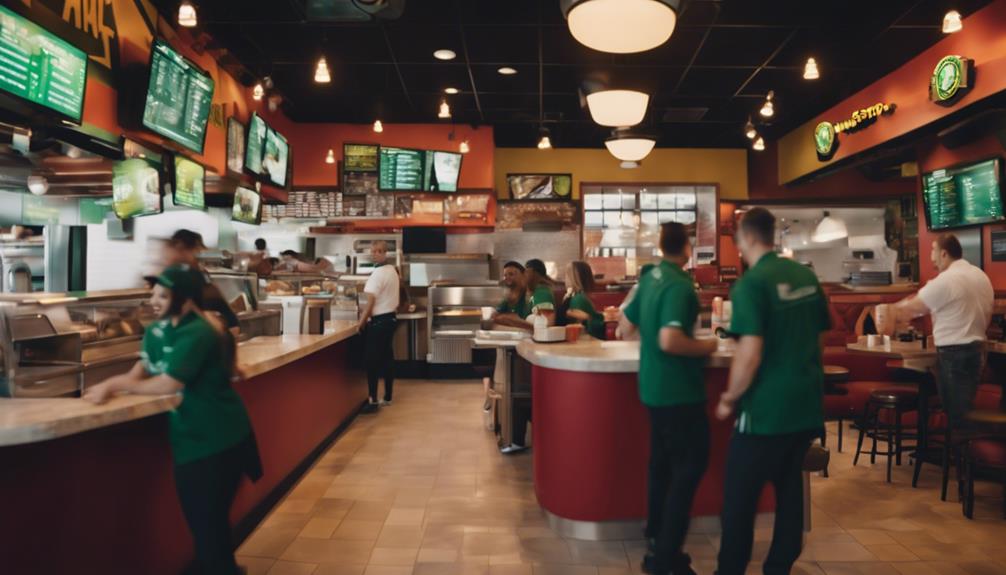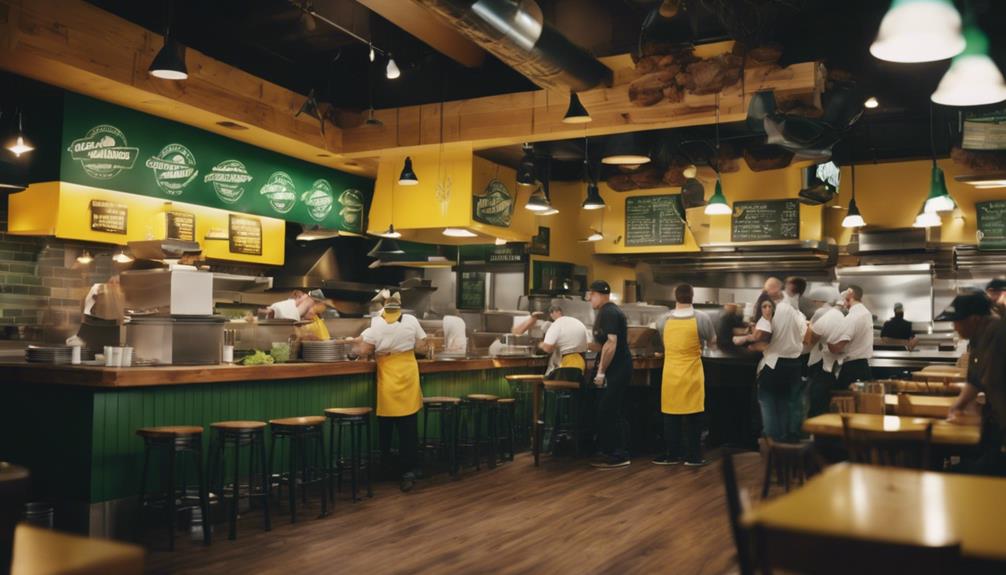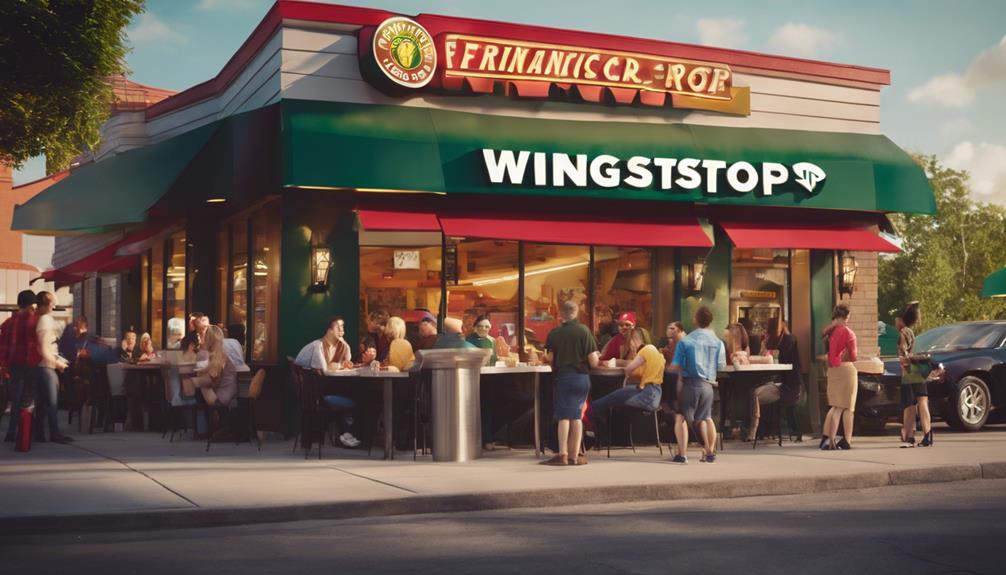Launching a Wingstop franchise offers an exciting opportunity in the thriving casual dining market. Wingstop is well known for its delicious buffalo-style wings, providing a unique dining experience that attracts a dedicated customer base. With an initial franchise fee of $20,000 and total investments ranging from $315,000 to $1 million, potential franchisees can take advantage of comprehensive training and continuous corporate support. Furthermore, financial assistance options are available to make ownership more attainable. As the demand for delivery services continues to rise, Wingstop’s expansion offers significant growth potential. To learn more about how to maximize this franchise opportunity, it is beneficial to explore further options.
Key Elements

The key elements of the Wingstop franchise encompass a solid company overview, a robust business model, and essential information for prospective franchisees.
Understanding these components helps potential investors gauge the franchise's viability and operational framework.
Company Overview
Founded in 1994 in Garland, Texas, Wingstop has quickly become a leading name in the fast-food industry, specializing in buffalo-style chicken wings.
Since entering the franchise sector in 1997, it has expanded to over 450 locations across 26 states. The company operates from its headquarters in Addison, Texas, and boasts an impressive annual growth rate of about 30%.
With an aviation-themed logo, Wingstop enhances brand recognition and appeal. Under the leadership of President & CEO Michael Skipworth, the brand maintains an active presence on social media, engaging customers and building community.
This combination of quality food and strategic marketing positions Wingstop as an attractive opportunity for aspiring franchisees looking to join a successful fast-food brand.
Business Overview
Wingstop's business model revolves around offering a unique dining experience centered on buffalo-style chicken wings, supported by a strong franchise system that enables rapid expansion and brand recognition.
The franchise leverages a menu focused on high-quality, flavorful wings, appealing to a wide customer base. Its aviation-themed branding enhances visibility and creates a memorable dining atmosphere.
Wingstop's commitment to exceptional customer service fosters loyalty and repeat business. With a robust marketing strategy, including social media engagement, the brand maintains a significant presence in the competitive fast-food landscape.
Additionally, the franchise's emphasis on operational efficiency and consistency guarantees that each location delivers the same outstanding experience, ultimately driving growth and profitability for franchise owners.
Information for Franchisees
Prospective franchisees should understand the essential elements that contribute to a successful Wingstop ownership experience, from initial investment requirements to ongoing support and operational guidelines.
The initial franchise fee is $20,000, with total investments ranging from $315,000 to $1 million. Franchisees must meet a minimum net worth of $1.2 million and have liquid cash of $600,000.
Wingstop provides extensive training and support, including 155.5 hours of on-the-job training and assistance with site selection and marketing.
Franchisees benefit from exclusive territories and a ten-year renewable agreement. Additionally, the royalty fee is 6%, alongside a 6% advertising royalty.
Understanding these key elements guarantees franchisees are well-prepared for their Wingstop journey.
Company Overview

Wingstop, founded in Garland, Texas, stands out for its commitment to flavor excellence, particularly with buffalo-style chicken wings.
Under the leadership of President & CEO Michael Skipworth, the franchise has expanded to over 450 locations across 26 states.
This impressive growth showcases the brand's appeal and potential for entrepreneurs looking to invest in a successful franchise.
Founded in Garland, Texas
In 1994, a passion for buffalo-style chicken wings sparked the creation of a restaurant in Garland, Texas, setting the stage for a thriving franchise opportunity. This establishment quickly gained popularity, leading to the formation of Wingstop, which ventured into franchising in 1997.
Since then, it has expanded to over 450 locations across 26 states, showcasing its appeal and success. The headquarters in Addison, Texas, oversees an impressive annual growth rate of approximately 30%.
With its aviation-themed logo and a commitment to a unique dining experience, Wingstop has cultivated a strong brand identity. Entrepreneurs looking to join a successful franchise can leverage this established foundation to achieve their business goals in the fast-food industry.
Commitment to Flavor Excellence
Building on its successful foundation, the restaurant's commitment to flavor excellence sets Wingstop apart in the fast-food landscape.
With a menu centered around buffalo-style chicken wings, Wingstop prioritizes quality ingredients and unique flavor profiles. Each wing is cooked to perfection and tossed in a variety of bold sauces, appealing to diverse taste preferences.
The brand's dedication to flavor innovation guarantees that customers enjoy fresh and exciting options, from classic choices like Original Hot to more adventurous flavors. This focus on flavor extends beyond the wings, creating a thorough dining experience that keeps customers coming back.
Wingstop's unwavering commitment to taste not only drives customer satisfaction but also fosters brand loyalty, making it an enticing opportunity for prospective franchisees.
Michael Skipworth, President & CEO
Michael Skipworth leads Wingstop Restaurants Inc. as President & CEO, driving the brand's growth and innovation in the competitive fast-food industry.
Under his leadership, Wingstop has expanded considerably since its founding in 1994, focusing on buffalo-style chicken wings and creating a unique dining experience.
Skipworth emphasizes the importance of brand recognition, leveraging the aviation-themed logo to attract customers. His strategic vision has fostered a culture of excellence, encouraging franchisees to deliver first-rate service and quality.
As a result, Wingstop has gained a devoted fan base, thriving in the fast-casual segment.
With Skipworth at the helm, the company is well-positioned for continued success and expansion, providing exciting opportunities for aspiring franchise owners.
Franchise Growth in 26 States
Under Skipworth's leadership, Wingstop has successfully expanded its franchise presence to over 450 locations across 26 states, solidifying its position in the fast-food market.
This impressive growth demonstrates the brand's popularity and the effective business model that attracts franchisees. Each restaurant embodies Wingstop's signature buffalo-style chicken wings, setting it apart from competitors.
The company's aviation-themed branding enhances its recognition and appeal. With an annual growth rate of about 30%, Wingstop continues to attract entrepreneurs enthusiastic to invest in a thriving franchise.
The support system in place, including extensive training and marketing assistance, fosters franchisee success, ensuring that each location contributes to the brand's ongoing expansion and prominence in the industry.
Brand Identity

Wingstop's brand identity stands out through its aviation-themed logo, which captures attention and reinforces its unique concept.
The franchise is committed to flavor excellence, showcased by its diverse range of signature sauces and flavors that keep customers coming back.
This combination of visual appeal and exceptional taste solidifies Wingstop's place in the competitive fast-food market.
Aviation-Themed Logo Appeal
The aviation-themed logo of Wingstop not only enhances brand recognition but also embodies the fun and energetic atmosphere that the franchise promotes.
This distinctive logo features elements that evoke a sense of flight, cleverly linking the dining experience to themes of adventure and excitement.
By using bold colors and dynamic shapes, Wingstop's logo captures attention and conveys a youthful spirit that resonates with customers.
This visual identity plays a vital role in creating a memorable brand, making it instantly recognizable in a crowded fast-food market.
Additionally, the logo reinforces the franchise's commitment to quality and customer satisfaction, as it symbolizes the journey to flavor excellence, which is at the heart of Wingstop's mission.
Commitment to Flavor Excellence
Flavor excellence drives Wingstop's brand identity, ensuring each wing served delivers a memorable taste experience that keeps customers returning for more.
The franchise's dedication to quality speaks volumes, as it sources high-quality ingredients to craft its offerings. By prioritizing freshness and flavor, Wingstop establishes itself as a leader in the competitive fast-food landscape.
Franchisees benefit from this strong brand identity, as it attracts a loyal customer base enthusiastic for the unique taste that only Wingstop provides.
Consistent quality control measures further reinforce this commitment, allowing franchise owners to maintain high standards at every location.
This unwavering focus on flavor excellence not only enhances customer satisfaction but also cultivates lasting relationships within the community.
Signature Sauces and Flavors
Crafting a unique identity in the fast-food market, Wingstop's signature sauces and flavors play a pivotal role in defining the brand's culinary appeal.
With a diverse array of choices, from classic Buffalo to unique flavors like Lemon Pepper and Garlic Parmesan, Wingstop caters to varied taste preferences. Each sauce is meticulously crafted, ensuring that every wing delivers an explosion of flavor.
This commitment to offering bold and distinctive options sets Wingstop apart from competitors, attracting a loyal customer base. Additionally, their flavors enhance the dining experience, encouraging patrons to explore new combinations.
Information for Franchisees

For aspiring franchisees, understanding the extensive support and resources available through Wingstop is essential for a successful venture.
Wingstop provides robust corporate assistance throughout the restaurant's launch and operation. New franchisees benefit from a rigorous training program that includes over 155 hours of direct, on-the-job instruction. Support extends to grand opening aid, site selection, lease negotiations, and strategic marketing.
Franchisees gain access to proprietary software for point-of-sale and operational efficiency, alongside advertising templates and loyalty program tools. Additionally, Wingstop encourages participation in franchise meetings and conventions, fostering networking and ongoing education.
With the option for absentee ownership, franchisees can manage their businesses flexibly, ensuring they stay aligned with Wingstop's successful franchise model.
Financial Requirements & Ongoing Fees

When considering a Wingstop franchise, potential owners must understand the financial landscape involved.
The initial franchise fee stands at $20,000, while total investments can range from $315,000 to $1 million, depending on various factors.
Ongoing fees include a 6% royalty and a 6% advertising royalty, alongside utilities and maintenance expenses that franchisees need to account for.
Total Investment From $315,000
The total investment to open a Wingstop franchise ranges from $315,000 to $1 million, depending on various factors such as location and franchise type. This investment covers expenses like equipment, leasehold improvements, and initial inventory.
Franchisees must meet financial requirements, including a minimum net worth of $1.2 million and liquid cash reserves of $600,000. Additionally, a $20,000 initial franchise fee is required.
Ongoing fees include a 6% royalty on sales and another 6% for advertising, which supports brand recognition.
Veterans may qualify for a $15,000 discount on franchise fees, while first-time franchisees often pay just $5,000.
Financing assistance through third-party lenders is available to help cover startup and operational costs.
20,000 Initial Franchise Investment
Investors interested in a Wingstop franchise should be prepared for an initial franchise fee of $20,000 along with a total investment that ranges from $315,000 to $1 million, depending on various factors.
To qualify, prospective franchisees must have a minimum net worth of $1.2 million and liquid cash of $600,000. This financial commitment covers startup costs, equipment, inventory, and other essential expenses.
Additionally, veterans can enjoy a $15,000 discount on franchise fees, while first-time franchisees may pay only $5,000.
For those seeking financing, Wingstop has established relationships with third-party lenders to assist with funding. Thorough financial planning is vital for ensuring the long-term success of the franchise.
% Ongoing Royalty Percentage
Wingstop franchisees are required to pay ongoing royalty fees amounting to 6% of their sales, along with an additional 6% dedicated to advertising efforts. These fees are structured to guarantee that franchisees contribute to the brand's overall marketing and operational success.
The total royalty percentage of 12% reflects the commitment to maintaining high standards and effective advertising that benefits all locations. Franchisees should factor these ongoing fees into their financial planning, as they greatly impact overall profitability.
Understanding these costs is vital for anyone considering joining the Wingstop franchise. By staying informed and prepared, potential franchise owners can better navigate the financial landscape of their new business venture.
% Advertising Royalty Fee
Franchisees contribute an additional 6% of their sales toward an advertising royalty fee, ensuring robust marketing efforts that enhance brand visibility and support overall profitability.
This fee allows Wingstop to implement thorough advertising campaigns, leverage social media, and develop promotional materials that resonate with customers.
By pooling resources, franchisees benefit from a unified brand message that attracts more patrons and increases sales across the board.
The advertising royalty fee is essential for maintaining a competitive edge in the fast-food market, as it enables Wingstop to adapt to changing consumer preferences and market trends.
Utilities and Maintenance Expenses
Utilities and maintenance expenses are fundamental ongoing costs that can greatly impact a franchise's profitability and operational efficiency. Franchisees must budget for electricity, water, gas, and waste disposal, as these utilities are essential for daily operations.
Additionally, regular maintenance of equipment and facilities, including HVAC systems, kitchen appliances, and plumbing, guarantees a safe and pleasant environment for both employees and customers. Neglecting these expenses can lead to unexpected repairs and downtime, which can considerably affect revenue.
Financing Options

When exploring financing options for a Wingstop franchise, prospective owners can take advantage of in-house financing solutions offered by the company.
Additionally, alternative funding sources and government-backed financing programs can further support their investment needs.
Understanding these options is essential for ensuring a successful financial foundation before launching their franchise.
In-House Financing Options Available
Wingstop offers various in-house financing options to help aspiring franchise owners manage their startup costs more effectively.
These options provide a practical way for franchisees to cover the initial franchise fee and other related expenses.
By utilizing in-house financing, franchisees can benefit from flexible repayment terms that align with their cash flow needs.
This support is especially advantageous for first-time franchise owners who may not have extensive capital readily available.
Additionally, Wingstop's commitment to franchisee success includes assistance in financial planning, ensuring owners understand their obligations and potential returns.
With these tailored financing solutions, prospective franchisees can confidently commence their journey with Wingstop, turning their entrepreneurial dreams into reality.
Alternative Funding Sources Available
Many aspiring franchise owners explore alternative funding sources to supplement their investments and manage costs effectively. Options like personal savings, family loans, and crowdfunding can provide essential capital without relying solely on traditional loans.
Additionally, franchisees may consider private investors who are interested in the restaurant industry. Some franchise owners turn to peer-to-peer lending platforms, which can offer competitive interest rates and flexible repayment terms.
Moreover, leveraging retirement accounts through strategies like a Rollover for Business Startups (ROBS) allows individuals to access funds without incurring penalties.
Utilizing these alternative funding sources can help franchisees secure the necessary capital to launch their Wingstop location while maintaining financial stability during the initial stages of their business.
Government-Backed Financing Options
Exploring government-backed financing options can provide franchisees with additional avenues to secure funding for their Wingstop investment. Programs like the Small Business Administration (SBA) loans offer favorable terms, including lower interest rates and longer repayment periods.
Franchisees can access capital through various SBA loan types, such as the 7(a) loan, which can cover startup costs, equipment purchases, and working capital. Additionally, local and state government initiatives may offer grants or low-interest loans to support small businesses in their communities.
Training & Support Offered

Wingstop offers extensive training and support for franchisees to guarantee their success.
New owners undergo 55.5 hours of thorough training, which is complemented by continuous skill enhancement workshops.
Additionally, franchisees receive ongoing assistance with marketing campaigns to boost their restaurant's visibility and profitability.
55.5 Hours of Training
With a robust initial training program totaling 155.5 hours, franchisees gain essential skills and knowledge to successfully operate their Wingstop locations. This thorough training includes both classroom instruction and hands-on experience, ensuring that franchisees understand everything from food preparation to customer service.
Franchisees also learn about inventory management, staffing, and compliance with health regulations. The program emphasizes the brand's culture and operational procedures, making it easier for new owners to implement strategies effectively.
Continuous Skill Enhancement Workshops
Continuous skill enhancement workshops provide franchisees with invaluable opportunities to refine their operational expertise and stay updated on industry trends.
These workshops focus on various aspects of running a successful Wingstop franchise, including customer service excellence, inventory management, and effective staff training.
Franchisees benefit from hands-on training and real-world case studies, allowing them to implement best practices in their operations.
In addition, participants can network with fellow franchise owners, sharing insights and strategies for overcoming common challenges.
This ongoing education guarantees that franchisees remain competitive in the fast-paced food industry.
Ongoing Marketing Campaign Assistance
Franchisees receive ongoing marketing campaign assistance, ensuring they effectively promote their businesses and attract customers.
Wingstop provides a wealth of resources, including advertising templates and strategic marketing plans tailored to local markets.
Franchisees benefit from collaboration with the corporate team, which offers insights into the latest trends and consumer preferences.
Regular training sessions and workshops keep franchise owners updated on marketing strategies and digital tools.
Additionally, franchisees can participate in national marketing campaigns, enhancing brand visibility.
Networking opportunities through meetings and conventions allow franchisees to share successful marketing tactics and learn from peers.
This extensive support empowers franchise owners to establish a strong local presence and drive sales growth consistently.
LEGAL AND REGULATORY

When considering a Wingstop franchise, understanding the legal requirements is essential.
Franchisees must comply with various regulations, including completing necessary documentation and adhering to operational standards set by the franchisor.
Familiarity with these legal obligations guarantees a smoother path to successful franchise ownership.
Franchise Legal Requirements Summary
When considering a Wingstop franchise, it's essential for potential franchisees to understand the legal obligations involved.
Key sections to review include the franchise agreement and regulatory requirements that govern operations.
Awareness of these legal aspects can help guarantee a smoother franchise experience and compliance with industry standards.
Key Sections to Review
Understanding the legal and regulatory requirements is essential for anyone considering a Wingstop franchise opportunity.
Franchisees must familiarize themselves with federal and state laws governing franchises, including disclosure documents and registration requirements.
Additionally, they should review the franchise agreement carefully to understand their rights and obligations.
Compliance with these legal standards guarantees a smoother franchise operation and protects both the franchisee and the franchisor.
Legal Obligations
Franchisees must comply with various legal and regulatory requirements that govern the operation of their Wingstop franchise. This includes adhering to local health codes, obtaining necessary permits, and following franchise disclosure regulations.
They'll also need to maintain accurate financial records and report earnings as stipulated in the franchise agreement.
Understanding these obligations is essential for successful franchise operation and compliance.
MARKET ANALYSIS

The market for Wingstop franchises is thriving, driven by a rising demand for delivery services that cater to consumers' busy lifestyles.
Millennial and Gen Z consumers, in particular, prioritize convenience and flavor, making Wingstop's menu an attractive option.
This growing demographic trend presents significant opportunities for franchisees looking to capitalize on the evolving fast-food landscape.
Rising Demand for Delivery Services
The rising demand for delivery services has markedly boosted the popularity of wings, especially in the fast-casual sector.
As consumers increasingly prefer the convenience of ordering food online, the wings market is forecasted to experience substantial growth.
Wingstop stands to benefit from this trend, positioning itself as a leader in the delivery space.
Increasing Popularity of Wings
As consumers increasingly seek convenience, the demand for chicken wings, particularly through delivery services, has surged considerably in recent years.
This trend reflects a broader shift towards on-demand dining, where quick and easily accessible meals are prioritized.
Wingstop, with its focus on flavorful wings and efficient delivery options, stands to benefit immensely from this growing market, attracting more customers looking for delicious, hassle-free meals.
Wings Market Growth Forecast
Rising demand for delivery services is fueling significant growth in the wings market, with projections indicating continued expansion as consumers prioritize convenience in their dining choices.
This trend benefits brands like Wingstop, which capitalize on delivery platforms to reach more customers.
As the market evolves, restaurants that effectively leverage delivery options will likely see increased sales and customer loyalty.
Millennial and Gen Z Consumers
Millennials and Gen Z consumers have become avid fans of Wingstop's offerings, driven by their love for bold flavors and unique dining experiences.
Their preference for convenience and social media engagement shapes how Wingstop markets itself, aligning with current trends in food consumption.
Understanding these demographic shifts is essential for franchisees aiming to tap into this lucrative market.
Millennial Wing Enthusiasts
The burgeoning popularity of buffalo-style chicken wings among millennial and Gen Z consumers presents a lucrative opportunity for the Wingstop franchise.
These demographics prioritize bold flavors and social dining experiences, driving demand for Wingstop's diverse menu.
Their inclination toward fast-casual dining further aligns with Wingstop's model, making it a prime target for franchise growth and investment in today's competitive market.
Consumer Preference Trends
With millennial and Gen Z consumers increasingly favoring bold flavors and shareable dining experiences, Wingstop is well-positioned to capitalize on these consumer preference trends.
Their appetite for unique, flavorful meals aligns perfectly with Wingstop's diverse wing offerings.
Additionally, the brand's emphasis on social media engagement resonates with younger audiences, making it an appealing choice for franchisees targeting this vibrant demographic.
EXIT STRATEGY

When franchisees consider their exit strategy, they should be aware of the available transfer options for their Wingstop locations.
The franchise transfer process involves specific guidelines that guarantee a smooth shift while maintaining brand integrity.
Understanding these steps can greatly impact the financial outcome of selling or transferring ownership.
Franchise Transfer Options Available
Franchisees can explore transfer options to sell or pass on their Wingstop location, guaranteeing a smooth change while adhering to the company's established protocols. These options allow franchisees to maintain their investment's value and facilitate a successful transition.
Whether due to retirement, personal circumstances, or a desire to pursue new ventures, franchisees can strategically plan their exit. Wingstop provides guidelines that support franchisees in finding qualified buyers who align with the brand's standards. This helps maintain brand integrity and operational continuity.
Franchise Transfer Process Guidelines
A clear understanding of the franchise transfer process guidelines is essential for ensuring a smooth exit strategy for Wingstop owners.
When a franchisee decides to transfer their ownership, they must first notify Wingstop's corporate office. The company requires a completed transfer application, along with the potential buyer's financial information. Franchisees are responsible for ensuring the new owner meets Wingstop's qualifications and standards.
Once approved, the transfer agreement needs to be signed, and a transfer fee may apply. It's vital for sellers to maintain operational standards during the shift to protect their investment and brand reputation.
ADDITIONAL RESOURCES

For potential franchisees, Wingstop offers a variety of additional resources that can enhance their understanding of the business.
These include opportunities to attend franchise conferences and trade shows, where they can network and gain valuable insights.
Additionally, inquiries can be directed to Wingstop's headquarters for further support and information on franchising.
Franchise Events and Resources
Attending franchise events can greatly enhance an entrepreneur's understanding of the industry while providing valuable networking opportunities and resources for success.
These events often feature workshops, panel discussions, and presentations from industry experts, helping potential franchisees grasp the intricacies of running a successful business. Entrepreneurs can connect with current franchisees, gaining insights into their experiences and best practices.
Additionally, Wingstop organizes conventions and training seminars that focus on marketing strategies, operational efficiency, and customer engagement. Access to these resources not only boosts confidence but also equips franchisees with essential tools to thrive.
Franchise Inquiries: Wingstop HQ
Franchise inquiries can be directed to Wingstop's headquarters, where potential franchisees can access essential resources and support.
The dedicated team at Wingstop HQ provides extensive information on the franchise process, including initial fees, financial requirements, and ongoing support. Interested individuals can obtain details about training programs, site selection, and marketing strategies aimed at ensuring a successful launch.
Additionally, the headquarters offers guidance on steering through franchise agreements and territory exclusivity. By reaching out to Wingstop HQ, prospective franchisees can clarify their questions, gather necessary documentation, and take the first steps toward joining a thriving brand.
Franchise Conferences and Trade Shows
Connecting with industry professionals at franchise conferences and trade shows can provide invaluable insights and networking opportunities for those interested in the Wingstop franchise.
These events offer franchisees and potential owners a chance to engage with experienced franchisees, industry experts, and Wingstop representatives. Attendees gain insights into best practices, operational strategies, and marketing techniques that can enhance their business.
Additionally, these gatherings often feature seminars and workshops that cover essential topics, from financial planning to customer engagement. Networking at such events can lead to valuable partnerships and mentorship opportunities, further solidifying an owner's place in the competitive foodservice market.
Ultimately, participating in franchise conferences and trade shows can be a game-changer for aspiring Wingstop franchisees.
What are the benefits of joining a franchise like Wingstop for entrepreneurs?
Join the servpro franchise revolution at Wingstop and tap into a proven business model with a recognized brand. As an entrepreneur, you can benefit from the established systems, ongoing support, and buying power of a franchise. This can lead to higher success rates and lower risk compared to starting a business from scratch.
Conclusion
In summary, launching a Wingstop franchise offers aspiring entrepreneurs a promising opportunity in the fast food industry.
With a strong brand identity, extensive support for franchisees, and a growing market presence, potential owners can feel confident in their investment.
By understanding the financial requirements and steering through the legal landscape, they can set themselves up for success.
With dedication and the right resources, a Wingstop franchise can become a thriving business venture.









